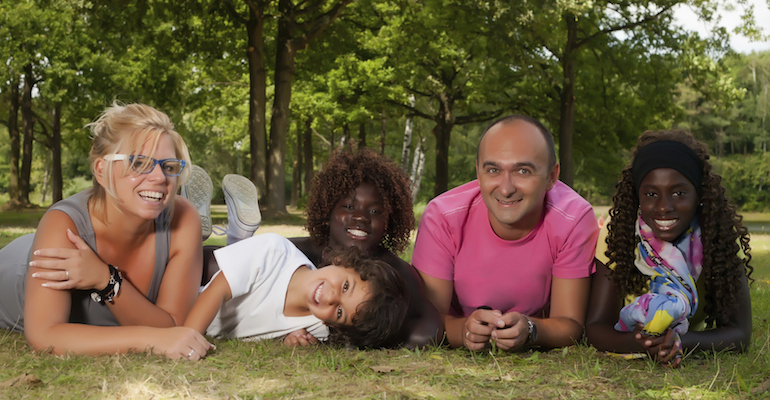When I adopted my youngest daughter domestically, attachment was difficult because she was hospitalized for three months. When she came home, I bought a soft-sling baby carrier. It allowed me to hold her close to my heart in a comforting fetal position for much of the day. Not only did this improve our attachment, it improved her health immensely. —Holly
Many books say that you shouldn’t pick up your baby every time she cries, lest she become “spoiled.” But when our daughter cried, we went to her. We felt it was important to let her know that we would meet her needs consistently. We quickly learned that our daughter doesn’t cry for no reason, and, once we figured out what her need was (and met it) the tears would stop. Our efforts have paid off: Our girl is happy, amiable, and peaceful. —Aaryn
We were fortunate to have an open relationship with our daughter’s birth parents, with whom we spent a great deal of time before our daughter was born. She was first placed in foster care, where we visited her at least twice a week. By the time we brought her home, we felt we had bonded already. The greatest struggle was simply helping her to become comfortable in her new surroundings. We brought blankets to the foster home on visits, to help her become familiar with the smell of our pet, our home, and us. We also brought familiar items, blankets, toys, and clothes, home from her foster situation. We kept as much as possible the same, bottles, diapers, lotions and soaps, formula, and — most importantly — routine. We bonded quite easily, and had little difficulty with our daughter’s transition into our home. —Lisa
Routine was very important to my kids. To this day, we eat lunch at noon and dinner at 6 p.m. That kept their schedule the same as it was at the children’s home, and it worked for us. —Robyn
Christopher was so used to being uncomfortable — cold, hot, hungry, even sick or hurt — that I had to help him identify what his body was experiencing. I had to name the cold he felt when the wind blew, then demonstrate how we block it by putting on a jacket. —Carrie
My son came home at almost five, so he had an entire life before we met. Treasuring the memories he has of his foster family and helping him remember and talk about them has helped a lot. It was well worth the effort to bring him home and become a family. —Cathy
The best advice I got was not to parent according to some fixed idea, but to let my children show me who they were before I imposed expectations on them. We knew our girls had never been apart, so we figured they would want to share a room. But we were imagining the typical American kid, who wants his own space, even in a shared room. Not so ours, who wanted their beds right next to each other. They could not handle any separation. We also learned that we needed to sit with them and leave a light and a radio on as they fell asleep. Most of that defies conventional parenting wisdom, but, if we had rigidly followed how we thought things should go, we would have ended up hurting them — and our family. —Sarah
Teresa’s attachment to us was an exciting and gratifying adventure. We played, cooked, went to movies, fixed up her room, and talked about the future. She told us one Sunday after worship that she believed angels had brought us together. —Mary
It was especially hard for our older daughter, who was six when we brought her home. She and her sister are both quite chatty, and were just dying to communicate. The older one was reading and writing a little in Hindi, and talked constantly. I learned some conversational Hindi, which got basic points across, but I wish I had known more. They both learned English at an amazing pace, though, so language wasn’t a problem for long. —Sarah
We adopted a sibling group from Samoa. Our daughter was three, and her brother was nine months. She spoke only Samoan, and we spoke only English. One of the challenges I faced was that she would come to me and say something. I could tell she wanted me to do something or respond, but I was clueless. She started to withdraw. I was very concerned about this, as she wasn’t coming to me for help or for comfort. I started spending a lot of time just holding her and rocking her. She has very dry skin, so I would massage lotion into her skin after her baths. I would talk to her, tell her stories, and just hold her. We had traveled in December to pick the children up, and I had purchased a couple of Samoan Christmas music CDs. I discovered that playing those CDs helped calm her … whether it was hearing her native tongue, or just the musical part … I’m still not sure. I think music can be a powerful resource for helping children deal with new situations. –Annette
Gena wanted to be in physical contact with me all the time. She would plaster herself to the shower door and whimper for me, or she would climb up on me just about anywhere I would sit. I somehow learned to do everything with one hand. —Susan
My oh-so-reluctant husband and I had our ups and downs with his hesitancy until our son was placed in our arms, when he arrived home from Korea. Wouldn’t you know, our nine-month-old son chose my husband to be the first one to smile at, and that’s all it took for my husband’s worries to melt away, and for him to fall in love with the child he wasn’t sure about. It’s been three wonderful years since we became a family, and I still look back at those difficult days of being at odds with my husband and thank the Lord for miracles. All I can say is to keep positive, and don’t ever give up on your dream of being a parent. —AF reader
I was not concerned about bonding with our son, because I think women have a natural tendency to bond and nurture. My husband did have concerns about bonding, and I explained that it was normal for him to feel that way and that he should not try to feel something that he wasn’t feeling. I knew how intimate feeding time was, so I asked my husband if he wanted to feed Liam one evening. The next time I checked in, Liam was rested on his father’s legs, and they were holding hands, looking at each other. It was truly the sweetest thing I had ever seen. —Lisa
We adopted our son at three days old, and I wanted to share with him the closeness that comes with breastfeeding. With the help of a lactation consultant, I prepared to try to breastfeed by taking various medications in the months leading up to the adoption. When our son came home, we tried breastfeeding with a supplementation system for about a week. Although it didn’t work in the end, we had a special week of bonding time. And I know that inducing lactation can work! —Melissa
The best thing we did after we came home from Russia was to ask that friends, and even family, leave us in peace for two weeks. That gave the four of us time together to adjust in relative calm. —Renee
We had less than two days to prepare to be parents, let alone to think about the specifics of bonding with our son, so we relied heavily on our instincts. The most important thing was to remain as relaxed as possible. We wanted Caleb to be in a soothing environment, so I didn’t sweat the small stuff. I would always feed Caleb close to me, and I rarely let others feed him. My husband would hold him with his shirt off, to make skin-to-skin contact (which we now know is immensely helpful in bonding). I would bathe with Caleb, sing, make eye contact, the things that every healthy mom does with her baby. We did what felt natural, and made our home our sanctuary. —Christine



